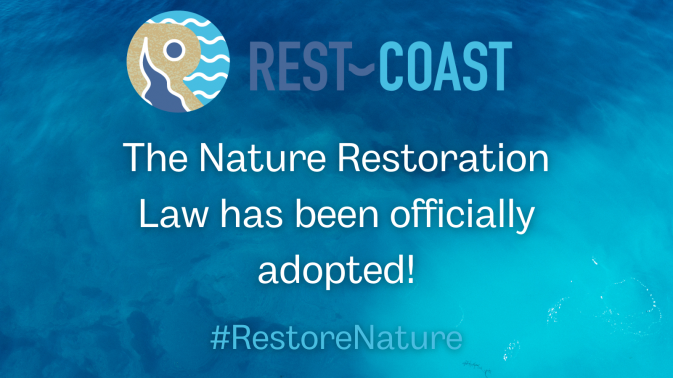
EU Member States approve the Nature Restoration Law in a final vote in Council today
The REST-COAST project celebrates the final adoption of the EU Nature Restoration Law (NRL), recognising it as a landmark step towards reversing biodiversity loss and restoring Europe's degraded ecosystems. This forward-thinking legislation, endorsed by the EU Member States, opens the door to a new era in EU environmental policy.
Revitalising and restoring ecosystems adds value to conservation efforts already enshrined in EU legislation. Still, it is a more proactive and inclusive approach that builds on collaborative efforts across sectors and societal actors and contributes to enhanced coastal protection.
The NRL aims to enhance ecosystem services such as water purification, flood regulation, and carbon sequestration and substantially contributes to climate resilience and the overall well-being of European citizens.
Prof. Agustin Sanchez-Arcilla, coordinator of the REST-COAST EU Green Deal project, stated, "The adoption of the Nature Restoration Law is a pivotal moment for Europe's environmental future. It underscores the importance of collaborative efforts and robust policies in achieving restoration goals for shared benefits among countries and generations. REST-COAST is committed to supporting these efforts by mobilising scientific research, data-driven solutions, and active stakeholder engagement."
● The NRL is expected to create between 180,000 and 207,000 jobs through the
full implementation of the Natura 2000 network (Source: PLOS ONE).
● Restoration activities have been shown to provide high benefit-cost ratios with
coastal wetlands, for instance, generate benefits up to 110 times the investment
cost (Source: OECD iLibrary).
● JOBS: Restoration activities’ employment multipliers range from 1.5 to 3.8,
highlighting significant job creation potential (Source: PLOS ONE).
● COST-SAVING: Coastal plains offer cost-effective solutions compared to
engineered protection defences, providing sustainable long-term benefits.
● RESILIENT: Coastal restoration, benefiting a large percentage of the EU population,
can yield benefits for the permanent population, tourist visitors and the concentrated
socioeconomic activities supported by coastal zones, providing Nature-based
Solutions for present and future generations (Sanchez-Arcilla et al., 2022).